|
|
|
Sort Order |
|
|
|
Items / Page
|
|
|
|
|
|
|
| Srl | Item |
| 1 |
ID:
186491
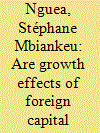

|
|
|
|
|
| Summary/Abstract |
Sub-Saharan Africa's electrification rate of 45% in 2018 remains extremely low compared with other developing regions. This study investigates if foreign capital could significantly contribute to enhancing the electricity access rate in Africa, a subject so far neglected in the literature. Specifically, it seeks to know whether increasing FDI, remittances and foreign aid matter for access to electricity in Africa. We utilize a dynamic panel System-Generalized Method of Moments (Sys-GMM) estimator to analyse data collected on a panel of 36 African countries over 2000–2017. The empirical findings show that FDI and remittances are positively and significantly related to increasing access to electricity. Moreover, our results show that foreign aid reduces the electricity access. We finally find that remittances reduce urban-rural disparities in access to electricity, while FDI and foreign aid increase disparities. These results remain consistent when we perform sub-regional analyses, suggesting that African countries should rely more on remittances and FDI to promote universal access to electricity.
|
|
|
|
|
|
|
|
|
|
|
|
|
|
|
|
| 2 |
ID:
185213
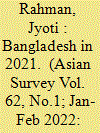

|
|
|
|
|
| Summary/Abstract |
Bangladesh celebrated its 50th year in 2021, marking significant improvement in the lives of its citizens. However, the celebrations were muted by not just the ongoing pandemic but also increasing authoritarianism. The economy was hit hard by the pandemic, but a recovery appears to be underway. A resolution to the Rohingya refugee crisis remains elusive, and in the long run the country remains acutely vulnerable to climate change.
|
|
|
|
|
|
|
|
|
|
|
|
|
|
|
|
| 3 |
ID:
115714
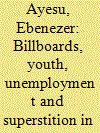

|
|
|
|
|
| Publication |
2012.
|
| Summary/Abstract |
On a sunny day in May 1983 a section of the youth of Mamfe-Akuapem in south-eastern Ghana - reeking heavily of alcohol and marijuana, armed with machetes and pick-axes and angrily singing war songs, drumming and dancing - went to the residence of Nana Ama Ansaa Sasraku III, their queen mother. Their mission was very simple. They were to inform her of their plans to demolish the billboard which welcomed motorists and visitors on their arrival in the town. According to them, the billboard was inhabited by an evil spirit responsible for the general incidence of unemployment and the absence of development in the town.
|
|
|
|
|
|
|
|
|
|
|
|
|
|
|
|
| 4 |
ID:
161622
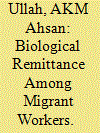

|
|
|
|
|
| Summary/Abstract |
The huge amount of remittance transfers has brought migration studies to the fore in the public and private discourse on global development. Since the time migration studies occupied a space in the academe, most research has been devoted to remittances in cash and their use. Prior to the mid-nineties, the debate about the concept of migrants’ ‘remittance’ has not entailed other forms of remittances other than remittances in cash. This research explores another form of remittance, that is, biological remittance. This research firstly explores how migrant populations handle ‘biological remittance’ in their societies, and secondly compares the experiences of female migrant workers in two countries with distinct cultural and religious mores. We collected empirical information from two countries: Indonesia and the Philippines. A total of 38 respondents (17 from the Philippines and 21 from Indonesia) were selected for this study by using the snowball technique. While all the respondents, irrespective of countries of origin, face ordeals coping with their situation, Indonesians bear more psychological burden than the Filipinos. This research has crucial implications for scholars, researchers and policy-makers alike.
|
|
|
|
|
|
|
|
|
|
|
|
|
|
|
|
| 5 |
ID:
071654
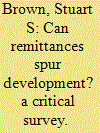

|
|
|
|
|
| Publication |
2006.
|
| Summary/Abstract |
The increasing volume of global remittances has impressed policymakers and social scientists alike. Besides outpacing official development assistance and private capital flows, remittances have proven markedly stable and counter-cyclical. They represent an essential nondebt creating, safety-net vehicle administered by extended families and local communities rather than provincial and national governments. This essay surveys the recent pattern of remittances and critically examines the theoretical and empirical literature on their determinants and welfare impact. The argument is made that the developmental contribution of remittances can be significantly enhanced through complementary macroeconomic policies in labor exporting countries and financial innovations in remittance transmission. Enhanced policy coordination on temporary transnational worker migration-as facilitated by Mode 4 of the General Agreement on Trade in Services-can prove instrumental in helping remittances offset the traditional brain drain besetting developing economies.
|
|
|
|
|
|
|
|
|
|
|
|
|
|
|
|
| 6 |
ID:
120704


|
|
|
|
|
| Publication |
2013.
|
| Summary/Abstract |
This paper deals with the changing idea of money and the transnational Indian family across generations and life stages. It draws on a qualitative study of 38 first and second generation Indian migrants to Australia. For first generation migrants, sending money home is one of the important ways of expressing belonging and care for the transnational family. Over time, the remittances become contested in terms of their value and their equivalence to physical care, raising questions of belonging. With multiple migrants, the family centres on Australia, which now becomes the source country when children migrate elsewhere. Money and gifts are sent home to Australia or to other countries. The nuclear family is the main reference point for most of our second generation migrants, but there remain some gift exchanges with extended family and charitable donations. These donations reflect a sense of ancestry rather than the locus of family. Hence accounts of sending money to India need to be supplemented by studies of the diffusion of the transnational family across different nodes of the diaspora. The study of remittances has to reflect this diffusion and change in the transnational family if it is to adequately explain how money is the medium of family relationships.
|
|
|
|
|
|
|
|
|
|
|
|
|
|
|
|
| 7 |
ID:
116894


|
|
|
|
|
| Publication |
2013.
|
| Summary/Abstract |
Natural resource rents, development assistance and unrequited foreign exchange inflows such as remittances relax the balance of payments constraint on economic growth. The failure of some governments to translate these resources into successful development has been attributed to an affliction called 'Dutch disease', or, more ominously, to a 'curse' associated with the availability of natural resources. This paper examines the disease/curse analysis and rejects it in favour of a political economy explanation of the problems associated with resource use. We argue that conventional analysis of resource-rich countries is misleading because its various manifestations are based on inappropriate assumptions and flawed logic. In practice the 'curse' and the 'disease' are outcomes of policy decisions, rather than manifestations of deep structural weaknesses, and they are more likely to be suffered in countries whose governments pursue neoliberal economic policies.
|
|
|
|
|
|
|
|
|
|
|
|
|
|
|
|
| 8 |
ID:
190742
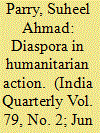

|
|
|
|
|
| Summary/Abstract |
Humanitarian action is commonly thought to involve two types of aid providers: international and local actors. But this tends to ignore a third humanitarian domain, namely transnational humanitarianism during conflicts, global epidemics and natural disasters by diaspora individuals and organisations. These transnational connections, which involve the mobility of people, goods and money, significantly change the context in which global humanitarian actors function and may have notable secondary effects on other aid providers. We contend that the significance of diaspora humanitarianism during natural disasters and the COVID-19 pandemic has still not been thoroughly explored in the academic literature and remains relatively ‘invisible’ in aid practices and policies. This article arises from an empirical study on the significance of diaspora in humanitarian action by analysing the impact of diaspora remittances and organisations that have emerged as an important potential for diasporas during humanitarian action. To examine the potential and role of the diaspora in humanitarian action, this article makes the case for the Indian diaspora’s humanitarian potential and efforts, particularly during the COVID-19 pandemic in India.
|
|
|
|
|
|
|
|
|
|
|
|
|
|
|
|
| 9 |
ID:
140827
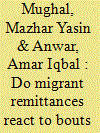

|
|
|
|
|
| Summary/Abstract |
This paper examines the short-run behaviour of migrant remittances in the face of terrorism. Using monthly data for post 9/11 terrorist attacks in Pakistan, the study finds evidence of increase in the volume of remittances sent from abroad. This increase is evident in the aggregate, as well as for the three main source regions of North America, the Persian Gulf and Europe. The positive association holds for all the top five migrant-hosting countries of Pakistan. The findings point in favour of an altruistic behaviour of migrant remittances at the macroeconomic level.
|
|
|
|
|
|
|
|
|
|
|
|
|
|
|
|
| 10 |
ID:
193235
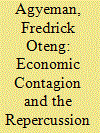

|
|
|
|
|
| Summary/Abstract |
The outbreak of the coronavirus disease in 2019 (COVID-19) wreaked havoc on the social, psychological, economic, and political buoyancy of all economic activities worldwide. The economic challenges caused by the interruption in worldwide economic activities significantly impacted remittances flow to low- and middle-income economies (LMIEs). This study used the past, present, and predicted remittances data of migration dynamics within countries to analyse the economic impact on remittances. Remittances to most LMIEs plunged during the pandemic intense period; however, the decline was temporary as the flows increased due to countrywide policies and individuals’ emergent needs. The trend of economic contagion is fundamentally unique in that even the primary source of remittance sending nations have been greatly impacted. The global nature of this pandemic raises numerous questions, including whether the decline in remittances will continue for a short term or will last for an extended period to stagnate LMIEs. This current study’s results reveal that while remittances flow to key recipient nations declined between 2019 and 2020, there has not been a sharp decrease and most of the nations were on the path of recovery in 2021. This study proposes that policymakers support remittances flow on a higher growth trend in successive years based on Sustainable Development Goals to attain global inclusive development. This research further recommends the adoption of higher technology transfer of remittances of migrant workers within the emerging and low- and middle-income economies.
|
|
|
|
|
|
|
|
|
|
|
|
|
|
|
|
| 11 |
ID:
188446
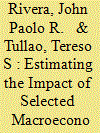

|
|
|
|
|
| Summary/Abstract |
As economic activities came to a standstill during the COVID-19 pandemic, the Philippines, like many economies across the globe, experienced rising inflation, currency depreciation and fluctuating capital markets. To manage these variables and stabilize the macroeconomy, the central bank resorted to monetary tightening. In the Philippines, a key mechanism that contributes to this stabilizing effect rests on remittances that have been cushioning the economy from the effects of volatilities and uncertainties in the global economy. During economic downturns and reduced capital flows, remittances provide support not only to recipient households but also to the country’s financial sector. Using time series analysis, we estimate the response of remittance inflows on impulses from selected macroeconomic variables, namely interest rate, inflation rate and exchange rate. A common characteristic shared by the selected indicators is their influence on recipient households’ consumption-related decision-making process. These findings warrant the need to redesign major institutional policies to manage remittances in light of their anticipated feedback effect on the economy.
|
|
|
|
|
|
|
|
|
|
|
|
|
|
|
|
| 12 |
ID:
080819
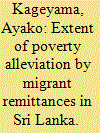

|
|
|
|
|
| Publication |
2008.
|
| Summary/Abstract |
After reviewing some of the available empirical literature on current trends of remittances and their economic impact on welfare of migrating countries, this study focuses on the case of Sri Lanka to demonstrate that workers' remittances may have both positive and negative consequences in home communities. Economically, remittances will benefit migrant households, particularly poorer ones, by increased income in the short term. However, they may sometimes cause negative social effects, particularly through disruption in family relations and also by creating a sense of relative deprivation in non-migrant communities. Therefore, migration and remittances are not the sole solution of poverty alleviation and appropriate policies also need to address unexpected adverse effects
|
|
|
|
|
|
|
|
|
|
|
|
|
|
|
|
| 13 |
ID:
108146
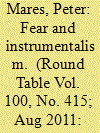

|
|
|
|
|
| Publication |
2011.
|
| Summary/Abstract |
Immigration and border protection policies are driven by national interest. However, the national interest can be more broadly and more narrowly conceived, depending in part on the degree to which the future of the individual state is understood to be contingent on a shared global future and on the recognition that the short-term costs of international cooperation may bring long-term collective benefits. Whereas such global interdependence is recognised in international statecraft in the domains of aid, trade and climate change, such recognition does not extend to immigration. Australia's national policies towards human movement from the Global South tend to be driven in large part by exaggerated fears (of unregulated border crossings) or a narrowly instrumental approach to the economic benefits of human capital transfers (migrants filling skills gaps and providing flexibility in the labour market). A broader conception of migration would take into account the potential developmental benefits of human movement for source nations and for migrants themselves.
|
|
|
|
|
|
|
|
|
|
|
|
|
|
|
|
| 14 |
ID:
103954
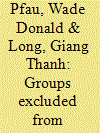

|
|
|
| 15 |
ID:
116073
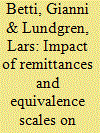

|
|
|
|
|
| Publication |
2012.
|
| Summary/Abstract |
The aim of this paper is to study the impact of remittances from labour migrants on welfare, as well as the impact of the use of equivalence scales on poverty, in Tajikistan. The magnitude of remittances sent back is fairly well known from official statistics (e.g. the amount of remittances is regularly monitored by the balance of payment at the Central Bank). In 2009 a change in the flow of money from abroad occurred, and volumes dropped, but it was unknown to what extent; its impact on poverty is still officially unknown. This paper describes a project aimed at conducting a survey to investigate this impact. It would not be possible to do this kind of analysis with a traditional sample survey, since it would generate only a small selection of migrant households. Instead, the new Migration, Remittances and Poverty Survey was used, which was conducted by the Tajik State Statistical Office in August 2010 using an adaptive sampling design from a set of enumeration areas selected mainly from the 2009 Integrated Household Budget Survey (IHBS) and showing households with remittances. To evaluate the impact of equivalence scales on poverty measures, new scales have been estimated on the basis of consumption expenditure from the 2009 IHBS.
|
|
|
|
|
|
|
|
|
|
|
|
|
|
|
|
| 16 |
ID:
172212
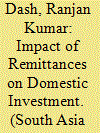

|
|
|
|
|
| Summary/Abstract |
Remittances inflow to South Asian countries increased significantly and is now one of the major sources of external finance overtaking traditional capital inflows such as foreign direct investment (FDI), foreign portfolio investment (FPI) and aid. However, the role of remittances in economic development has not been examined extensively, particularly for South Asian countries. This article examines the impact of remittances on domestic investment for South Asia over 1991–2017. Advanced panel estimation methods (unit root, cointegration and causality) are employed to account for potential country-specific heterogeneity and the endogeneity problem. Results of this study suggest that remittances increase domestic investment in the short term as well as in the long run for South Asia. This indicates that remittances are used not only for consumption purposes but also for investment activities such as human and physical capital development. The panel causality results suggest the presence of uni-directional causality running from remittances to domestic investment. Therefore, the result of this study supports the theoretical argument and previous empirical studies for other developing countries
|
|
|
|
|
|
|
|
|
|
|
|
|
|
|
|
| 17 |
ID:
180686


|
|
|
|
|
| Summary/Abstract |
Studies abound on international migration and remittances across the world and studies are particularly not lacking on the subject in Africa. There are however few studies on the moderating roles of information communication technology (ICT) and social media in the relationships among international migration, remittances and relationships in Sub-Saharan Africa. This article examines the dimension of ICT and social media in migration studies. This is an aspect that has often been ignored and overlooked even though ICT and social media have great contributions in the international migration process particularly as migrants and relatives in sending and receiving countries both have the primary experience. Research objectives include: reasons for emigration; information technology/social media used by migrants and their kin as they relate across spaces; and how ICT affects relationships of kin and international migrants. Secondary data were gathered through journals, books, documents and reliable Internet sources. Primary data were gathered in Ibadan, Nigeria in 2018 through 30 in-depth interviews analysed through content analysis. Findings reveal the nature of ICT used by international migrants and their kin and purpose of utilization and the effects of ICT on international migration, remittances and kinship networks. The article presents detailed data, narratives, interpretations and implications of relationships among international migration, ICT/social media and kinship networks. This article argues that ICT/social media is central to international migration decision-making, access of migrants and kin to social forces and factors motivating international migration, and it is very important to how migrants and kin maintain and/or weaken relationships and access to remittances and utilization.
|
|
|
|
|
|
|
|
|
|
|
|
|
|
|
|
| 18 |
ID:
142825
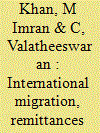

|
|
|
|
|
| Summary/Abstract |
The article examines the impact of international migration on the labour supply of male and female left-behind household members in both market and non-market work. In addition, we examine the labour supply behaviour of women whose husbands have migrated abroad. After controlling for potential endogeneity using the instrument variable (IV-probit) approach, estimates show that the supply of male and female left-behind members in market work decreases. While international migration results in the relocation of labour supply of male left-behind members from salary and casual wage workers to self-employed workers, it increases female left-behind members’ participation in household duties and reduces their participation in unpaid family work. The heterogeneity effect confirms that the impact of international migration is greater in rural than in urban areas.
|
|
|
|
|
|
|
|
|
|
|
|
|
|
|
|
| 19 |
ID:
147275
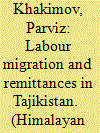

|
|
|
| 20 |
ID:
166880
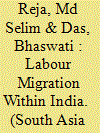

|
|
|
|
|
| Summary/Abstract |
Large-scale interstate labour migration within India is facilitated by the freedom of movement for citizens within this huge nation state. However, such internal labour migration within India remains largely unstudied and offers huge scope for gaining significant new knowledge. Focusing particularly on migrant construction workers from West Bengal moving to Kerala, this article specifically examines the motivations of these migrants and the role of social networks in the development of such migration streams. A field survey in Kerala indicates that Kerala’s Gulf connection and rapid demographic transition have resulted in significant reduction of local supplies of labour, thus attracting more migrants from other states in India due to better job opportunities, higher wages and good payment systems. Networks within migrant groups, especially friends’ contacts, are found to be the strongest factor in supporting this migration process.
|
|
|
|
|
|
|
|
|
|
|
|
|
|
|
|
|
|
|
|
|